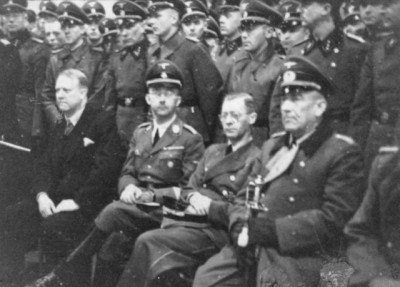A new book that highlights Norwegian complicity with Nazi occupiers during World War II is setting off controversy in Norway because it clearly identifies Norwegian members of Statspolitiet, the Norwegian version of the ruthless Gestapo. One former member is already threatening legal action against Oslo-based publishing firm Kagge Forlag.

Erling Kagge, who has climbed Mt Everest, skied to the South Pole and now runs Kagge Forlag, stands by his decision to allow author Eirik Veum to name Norwegians who took part in arresting, questioning, torturing and even murdering fellow Norwegians believed to be members of the resistance. Veum contends that some of the Norwegian members of the much-feared state police were more ruthless than their Nazi German colleagues.
“We should know that Norwegians committed some of the worst offenses during the war,” Veum told newspaper Aftenposten when the book was released on Monday. “We were more involved in war crimes that we’ve realized.”
The book is titled Nådeløse nordmenn, which translates to “Merciless-” or “Ruthless Norwegians,” and it offers what Veum, a journalist for Norwegian Broadcasting (NRK), claims is new information not previously revealed about the operations of Norway’s state police from 1941 to 1945. Several of the Norwegians who took part in the torture and executions of other Norwegians are named for the first time.

That’s what’s set off the debate this week, between those contending Norwegians should know who actually carried out many of the war crimes in Norway, and those contending that the identification is unnecessary after so many years and puts new burdens on the descendants of the state police officers and the surviving officers themselves. Many were convicted after the war for their actions, and seven were executed after the war.
Veum names 72 Norwegian members of the state police who were convicted after the war for having taken part in the executions of Norwegian resistance fighters. His book also contains information on the more than 900 Norwegians who were part of what most viewed as the Norwegian chapter of the Gestapo.
They had, among other duties, responsibility for the arrests of 771 Norwegian Jews in the autumn of 1942 along with leading the fight against Norwegian resistance forces. Most of the roughly 1,000 Norwegians were also members of the Norwegian political party at the time called Nasjonal Samling (NS), the local equivalent of the Nazi party.
So ruthless were the Norwegians in their torture of resistance suspects, according to Veum, that their German colleagues were shaken and stepped in to stop it. Some of the Norwegians were removed from their posts because their sadistic abuse of fellow Norwegians “crossed the line,” according to Veum. He reports that the use of drugs and alcohol among members of the state police was high, and that some members of local Norwegian police forces also took part at times in the abuse of prisoners.
‘Uncomfortable’ history
Veum knew the book would stir controversy, not least because it’s so “uncomfortable” for many Norwegians who prefer to dwell on their country’s resistance to the Nazis than their cooperation. He was able to track down some of the few state police officers still alive and said his requests for interviews were rejected by all but two, who spoke with him on the grounds their information would not be attributed to them. “None of those I contacted showed any regrets,” Veum told Aftenposten.
Several current historians oppose Veum’s and Kagge’s decisions to identify the state police officers, contending that many were duly punished and shouldn’t be subject to further burdens from their past now. Arnfinn Moland, director of the Norwegian Resistance Museum, and senior researcher Terje Emberland of the Holocaust Center, also contend that “rank and file” members of the state police shouldn’t be subjected to the shame of identification now. While the leaders can be held accountable for their actions, others likely felt pressured into doing what they did.
One former member of the state police who’s named in the book told Trondheim newspaper Adresseavisen that he may try to stop its distribution. He claimed he was against Nazi Germany but supported the NS and its leader Vidkun Quisling, who was executed as a traitor after the war.
“It’s terrible that I should be plagued by my past after 70 years,” he told Adresseavisen. “If folks I know read this book, I’ll lose face. Not everyone in my family knows about my NS background.”
Views and News from Norway/Nina Berglund
Please support our news service. Readers in Norway can use our donor account. Our international readers can click on our “Donate” button:

